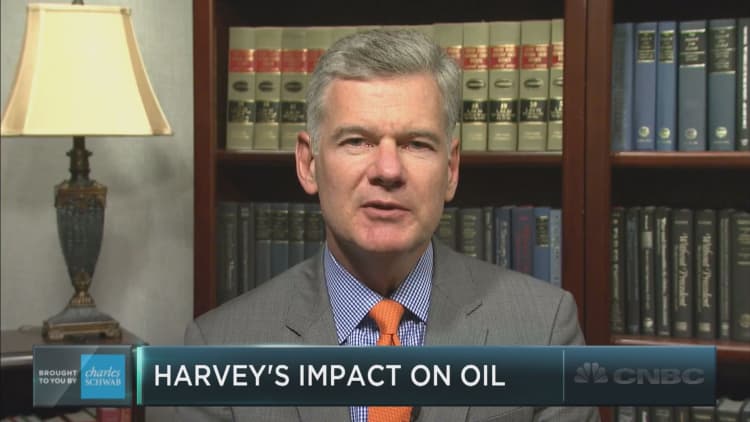
Hurricane Harvey's path of destruction may not drive oil prices higher, and that would be very unusual for a storm of this magnitude.
Mark Yusko, who's known for calling last year's oil crash, doesn't see the same dramatic price spike that occurred when Hurricane Katrina hit New Orleans in 2005.
During Katrina, 95 percent of oil production was crippled, and crude went above $70 a barrel. But Harvey is doing something else.
"In this case, it really skirted the offshore platforms, and it's really hitting the refineries instead. So, the refineries are all shutting down," said Yusko, CEO and CIO at Morgan Creek Capital Management, Monday on CNBC's "Trading Nation."
"That's actually going to increase stocks which are already far too high. So, you're going to see some negative pressure in the short term."
Oil fell nearly 3 percent Monday to settle at $46.57 — its worst daily performance since July 7.
Meanwhile, refinery stocks are on a tear. The VanEck Vectors Oil Refiners ETF is up nearly 5 percent over the past week — with stocks such as PBF Energy, HollyFrontier and Andeavor seeing the strong intraday performances.
Harvey is also pushing RBOB Gasoline Futures higher. Those prices spiked Monday, and are now up 9 percent over the past week.
According to Yusko, those bloated prices are temporary.
"We could see another 5 to 10 percent increase over the next couple of weeks. It would likely come back down pretty quickly after that," he said.
As for oil, Yusko is sticking with his year-end forecast which calls the commodity to be wedged in the $40 to $60 a barrel range. But due to Harvey, he now expects prices will stay at the lower end of that projection longer.
"It will take some time to get all the infrastructure back up and running. But it won't last for months or years. So, I think we'll probably have a couple of week blip, and then you'll start to see some pressure relieve there as the refineries come back online," Yusko said.







